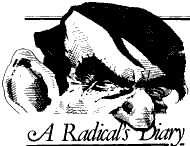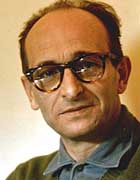[Verbatim trial transcripts | David Irving's "Radical's Diary" für Jan.: 28 | 31 | Feb: 1 | 2 | 3 | 5 | 7 | 8 | 10 | 15 | 16 | 17 | 20 | 24 | 28 | Mar: 1 | 2]
March
1, 2000 (Wednesday)
I sort out ten sets of photographs of German meetings: audiences all quiet, middle aged, etc., no "skinheads" or placards in sight. 10:20 at the High Court. Israeli TV team waiting outside collars me for a news interview. I am apprehensive when I see out of the corner of my eye one young yarmulka'd thug do a U-turn and follow me into the building, but he soon vanishes. The courtroom is filled with Israeli youngsters and a party of French students (or was that yesterday?). The Israelis are quite boisterous, and one deliberately barges into me in the corridor outside. Tough guys! Court begins at 10:35 a.m.
It is difficult to see how far this kind of pseudo-academic guff impresses the Court. If it does, then God help us, there is nothing I can do about it. You cannot argue against it any more than you can fish for blancmange with a hook. Judge Gray becomes quite cross as my detailed cross-examination drags on, each question provoking interminable and often seemingly pointless replies from the witness. Finally in exasperation he says that he will give me half an hour, effectively, to finish the job after lunch, and that I should deal only with the bigger "rogues" of the gallery. I am apprehensive about this, as Richard Rampton QC will then surely pounce on any items I have not traversed. At the end of the afternoon Rampton re-examines for an hour. He introduces new documents, and despite my protest the Court allows me to re-examine on them. Among them is a typed transcript of the thrice-edited video anthology: I make vociferous protests about this kind of evidence, to no avail. Rampton also produces a letter I wrote to Dr Gerhard Frey and my Munich lawyer on January 30, 1991 (making over-much of the date, "January 30") and suggests to Funke that anybody who seeks to restore Germany's old borders is a right wing extremist. Cross-examining again, I extract from the witness the concession that the German Constitution, which he is sworn to uphold, makes it an express duty of every German citizen to strive to restore unification within Germany's old frontiers! The main problem in this little bundle is the vile anti-Semitic remarks which Ernst Zündel uttered (if the transcript is right) at Hagenau: I certainly was not present when he did. He refers e.g. to the Judenpack. Another point which Rampton made (although this is more easily dealt with) the "portable one-man gas chamber" eye-witness statement, which I have ridiculed in speech after speech. Rampton introduces, against my protests, just the fragment of speech quoting the description, without making plain it is a summary of a ridiculous eye-witness report. When I refer in one question to the fact that a left-wing city official of Munich was able to utter in November 1993 a document which bans me from the entire "German Reich," Rampton assumes I have made a Freudian slip; I educate him -- it was sarcasm aimed at the Germans, and I had assumed that he, as a Master of Sarcasm, would have understood that at once. Eighty-four e-mails are waiting for me in the evening. Aaargh. One of them, from one of my consultants, L., comments on the latest transcripts now posted (and which I am paying heavily for): Looking over the transcripts, I notice the following .... Quite so. In the evening I host at Duke Street a crowd of journalists -- from the Suddeutsche Zeitung, Kurt Mälarstedt of Dagens Nyheter* of Stockholm, Thomas Spence of Aftenposten, various assorted Israeli journalists, ZDF television, and other media concerns until 8 p.m. Jessica decides to join in the interviews. The
Eichmann Memoirs have restarted the media interest in the
trial -- and tomorrow the public flogging resumes.
* Resulting article by Kurt Mälarstedt of Dagens Nyheter (March 4, 2000): Excerpt: Ytligt sett handlar målet "Irving v Penguin Books and Lipstadt" i Royal Court of Justice i London om huruvida en amerikansk professor förtalat en brittisk författare genom att beteckna honom som en farlig förnekare av Förintelsen, en man "som anpassar historiska fakta tills de passar hans ideologiska böjelser och politiska agenda". Djupare sett handlar det om hela Förintelse-begreppet och om dess plats i samtidshistorien. [Transl.: On the surface the trial "Irving v. Penguin Books and Lipstadt" in the Royal Court of Justice in London is whether an American professor has defamed a British author by naming him a dangerous denier of the Holocaust, a man who "adjusts historical facts to his ideological convictions and political agenda". In a deeper sense it is about the whole Holocaust conception and its place in comtemporary History"] | ||

 I
state to Judge Gray that I have printed out the
complete Eichmann papers, and I hand the Judge five
pages referring substantively to Hitler or Führer. He
says we can not deal with those today; quite right. I
continue with the cross-examination of Professor Hajo
Funke, the expert on German extremism. He seems somewhat
exhausted, his answers are slow and occasionally more
muddled than yesterday, and he is noticeably more irritable,
particularly when I make mocking reference to the "consensus
of expert opinion" which he has repeatedly cited as one
basic source, and to the "social sciences" which he has
cited as his other, for stating that certain people or
bodies were right wing extremists.
I
state to Judge Gray that I have printed out the
complete Eichmann papers, and I hand the Judge five
pages referring substantively to Hitler or Führer. He
says we can not deal with those today; quite right. I
continue with the cross-examination of Professor Hajo
Funke, the expert on German extremism. He seems somewhat
exhausted, his answers are slow and occasionally more
muddled than yesterday, and he is noticeably more irritable,
particularly when I make mocking reference to the "consensus
of expert opinion" which he has repeatedly cited as one
basic source, and to the "social sciences" which he has
cited as his other, for stating that certain people or
bodies were right wing extremists.